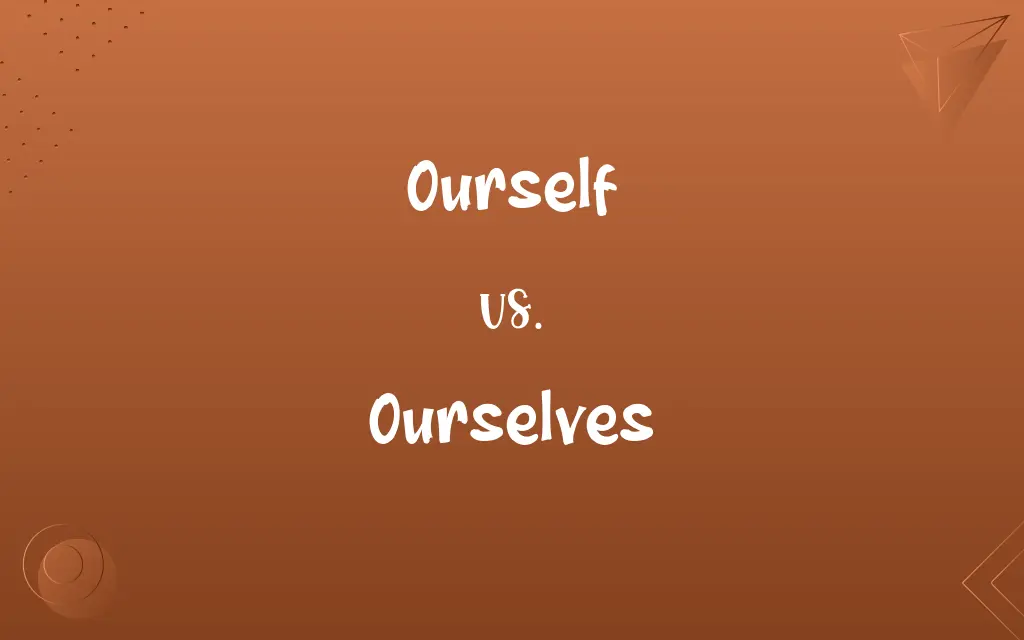Ourself vs. Ourselves: Know the Difference

By Shumaila Saeed || Updated on December 25, 2023
Ourself refers to one's own person for a singular entity, while Ourselves is used for a group referring to themselves.

Key Differences
Ourself is a reflexive or intensive pronoun used singularly, often in formal or royal contexts, to refer back to the subject of the sentence. Ourselves, on the other hand, is also a reflexive or intensive pronoun but used plurally, referring back to a group including the speaker.
Shumaila Saeed
Dec 01, 2023
The use of Ourself is relatively rare, primarily seen in contexts where an individual with authority or dignity speaks on behalf of an institution or group. Ourselves is commonly used in everyday language, representing a collective group that includes the speaker.
Shumaila Saeed
Dec 01, 2023
In terms of grammatical correctness, Ourself is appropriate when a singular individual is emphasizing their own actions or feelings, often in a formal setting. Ourselves is appropriate when a group is emphasizing their collective actions or feelings.
Shumaila Saeed
Dec 01, 2023
Usage of Ourself could potentially create confusion in casual conversation due to its formal and less common nature. Ourselves is straightforward and widely understood, making it a more common choice in both spoken and written English.
Shumaila Saeed
Dec 01, 2023
The choice between Ourself and Ourselves thus hinges on the number and formality of the subject. Ourself aligns with singular, formal, or authoritative tones, while Ourselves aligns with plural, informal, or communal tones.
Shumaila Saeed
Dec 01, 2023
ADVERTISEMENT
Comparison Chart
Formality
More formal, used in royal or dignified contexts
Less formal, common in everyday use
Shumaila Saeed
Dec 01, 2023
Contextual Usage
Used by individuals in authority or representing a group
Used by individuals referring to a group including themselves
Shumaila Saeed
Dec 01, 2023
Grammatical Implication
Refers to the self of a singular entity
Refers to the selves of multiple entities
Shumaila Saeed
Dec 01, 2023
ADVERTISEMENT
Ourself and Ourselves Definitions
Ourself
Used for emphasis by a speaker on their singular action or decision.
We must each take responsibility, ourself included.
Shumaila Saeed
Dec 01, 2023
Ourselves
Plural reflexive form used by a speaker referring to themselves and others in their group.
We will do the work ourselves.
Shumaila Saeed
Dec 01, 2023
Ourself
Singular form emphasizing personal involvement or action.
To ensure success, I will oversee the project ourself.
Shumaila Saeed
Dec 01, 2023
Ourselves
Reflects collective responsibility or action of a group including the speaker.
We must prepare ourselves for the challenges ahead.
Shumaila Saeed
Dec 01, 2023
Ourself
Formal pronoun used by monarchs or leaders when speaking of their own person.
We have made our decision, ourself.
Shumaila Saeed
Dec 01, 2023
ADVERTISEMENT
Ourselves
Used for emphasis on a group's collective action or decision.
We must solve these issues ourselves.
Shumaila Saeed
Dec 01, 2023
Ourself
Singular reflexive form used by a speaker to refer to themselves, especially in a formal or authoritative context.
As the CEO, I have decided this myself, ourself.
Shumaila Saeed
Dec 01, 2023
Ourselves
Plural form emphasizing group involvement or collective action.
We, as a team, will complete this project ourselves.
Shumaila Saeed
Dec 01, 2023
Ourself
A singular reflexive pronoun emphasizing the individual's role in the context.
I, as the team leader, will handle this ourself.
Shumaila Saeed
Dec 01, 2023
Ourselves
Indicates a group's personal or collective effort without external help.
We need to figure this out ourselves.
Shumaila Saeed
Dec 01, 2023
Ourself
(reflexive pronoun) royal]] or editorial we: myself (as used by a monarch, writer or speaker who is referring to themself as we).
In the present study, we will limit ourself to the simplest of cases.
Shumaila Saeed
Oct 19, 2023
Ourselves
(reflexive pronoun) Us; the group including the speaker as the object of a verb or preposition when that group also is the subject.
We should keep this for ourselves.
Shumaila Saeed
Oct 19, 2023
Ourself
(reflexive pronoun) The reflexive of the generic we: oneself.
We should love our neighbor as ourself.
Shumaila Saeed
Oct 19, 2023
Ourselves
(emphatic) We; intensifies the subject as the group including the speaker, especially to indicate that no one else satisfies the predicate.
We did it ourselves.
Shumaila Saeed
Oct 19, 2023
Ourselves
An emphasized form of the pronoun of the first person plural; - used as a subject, usually with we; also, alone in the predicate, in the nominative or the objective case.
We ourselves might distinctly number in words a great deal further then we usually do.
Safe in ourselves, while on ourselves we stand.
Unless we would denude ourself of all force.
Shumaila Saeed
Oct 19, 2023
Repeatedly Asked Queries
Can "ourselves" refer to just two people?
Yes, "ourselves" can refer to any plural group, including just two people.
Shumaila Saeed
Dec 01, 2023
Can "ourself" be used in casual conversation?
It's uncommon and might sound overly formal or outdated in casual conversation.
Shumaila Saeed
Dec 01, 2023
Is it ever correct to use "ourself" in place of "ourselves"?
Generally no, unless you are in a formal context speaking as an individual representing a group.
Shumaila Saeed
Dec 01, 2023
Can "ourselves" be used for emphasis?
Yes, it can emphasize the group's involvement or responsibility.
Shumaila Saeed
Dec 01, 2023
Are there synonyms for "ourself"?
Not exactly, as its use is quite specific and context-dependent.
Shumaila Saeed
Dec 01, 2023
Can "ourselves" be used in formal writing?
Yes, it can be used when referring to a group that includes the writer.
Shumaila Saeed
Dec 01, 2023
When should I use "ourself"?
Use "ourself" when speaking formally as an individual representing a group or in a position of authority.
Shumaila Saeed
Dec 01, 2023
Is "ourself" grammatically correct?
Yes, it is correct in specific formal contexts, especially when an individual represents a group or authority.
Shumaila Saeed
Dec 01, 2023
Why is "ourselves" more common than "ourself"?
"Ourselves" is used in everyday language for plural subjects, making it more common and widely applicable.
Shumaila Saeed
Dec 01, 2023
Is "ourself" limited to royal or official language?
It's most common in these contexts but can be used in other formal settings.
Shumaila Saeed
Dec 01, 2023
Is "ourself" common in modern English?
It's relatively rare and mostly used in formal or specific contexts.
Shumaila Saeed
Dec 01, 2023
Can "ourselves" imply exclusion of others?
Yes, it can imply an action or decision made without external involvement.
Shumaila Saeed
Dec 01, 2023
Are there cultural variations in using "ourself" and "ourselves"?
Usage might vary slightly, but the fundamental grammar remains consistent in all forms of English.
Shumaila Saeed
Dec 01, 2023
Are "myself" and "ourself" interchangeable?
No, "myself" is singular and personal, while "ourself" is singular but representative of a group.
Shumaila Saeed
Dec 01, 2023
Can "ourself" be used informally?
It's not standard in informal usage and might sound awkward.
Shumaila Saeed
Dec 01, 2023
Does "ourselves" have different meanings?
Its core meaning as a plural reflexive pronoun remains constant, but contextual implications can vary.
Shumaila Saeed
Dec 01, 2023
Does "ourselves" always imply collective action?
Generally, yes, it refers to actions or feelings involving the speaker and others.
Shumaila Saeed
Dec 01, 2023
Can "ourself" be plural?
No, "ourself" is always singular, even when representing a group.
Shumaila Saeed
Dec 01, 2023
Can "ourselves" be used in a singular sense?
No, "ourselves" is strictly plural.
Shumaila Saeed
Dec 01, 2023
Is "ourself" a recent addition to English?
No, it's been part of English for centuries, though its usage has declined.
Shumaila Saeed
Dec 01, 2023
Share this page
Link for your blog / website
HTML
Link to share via messenger
About Author
Written by
Shumaila SaeedShumaila Saeed, an expert content creator with 6 years of experience, specializes in distilling complex topics into easily digestible comparisons, shining a light on the nuances that both inform and educate readers with clarity and accuracy.








































































